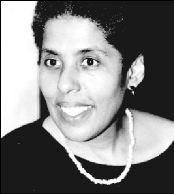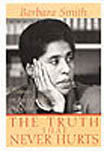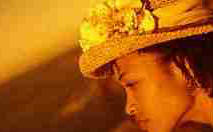


















































































































 
Books By Barbara
Smith
Home Girls: A Black Feminist Anthology
The Truth That Never Hurts: Writings on Race, Gender and Freedom
Yours in Struggle: Three Feminist Perspectives on AntiSemitism and Racism
This Bridge Called My Back: Writings by Radical Women of Color
All the Women Are White, All the Blacks Are Men, but Some of Us Are Brave: Black Women's Studies
Conditions is A feminist magazine of writings by women with an emphasis on
writing by lesbians
|
Barbara Smith...
Author, Activist, And Independent Scholar
 "The near
nonexistence of Black lesbian literature which other Black
lesbians and I so deeply feel has everything to do with the
politics of our lives, the total suppression of identity that
all Black women, lesbians or not, must face. This literary
silence is again intensified by the unavailability of an
autonomous Black feminist movement through which we could fight
our oppression and also begin to name ourselves." "The near
nonexistence of Black lesbian literature which other Black
lesbians and I so deeply feel has everything to do with the
politics of our lives, the total suppression of identity that
all Black women, lesbians or not, must face. This literary
silence is again intensified by the unavailability of an
autonomous Black feminist movement through which we could fight
our oppression and also begin to name ourselves."
--Smith, 1998
Barbara Smith is an author and independent
scholar who has played a groundbreaking role in opening a
national cultural and political dialogue about the intersections
of race, class, sexuality, and gender. In her innovative and
pivotal work, Smith was among the first to define an African
American women's literary tradition and to build Black women's
studies and Black feminism in the United States. She offers a
consistently fresh approach to discussing complex social
problems, especially racism and other types of bigotry.
Smith is acknowledged as one of the first writers in the United
States to claim black feminism for black women in the early
1970s. She has done groundbreaking work in defining a black
women's literary tradition, in examining the sexual politics of
the lives of women of color, in representing the lives of black
lesbians and gay men, and in making connections between race,
class, sexuality, and gender.
A leading feminist writer and activist since the
1960s, Barbara Smith co-founded Kitchen Table: Women of Color
Press, the first U.S. publisher for women of color. Smith's
articles, essays and short stories have appeared in publications
including Ms.,
The New York Times Book
Review, The Black Scholar,
The Nation and Gay
Community News. Editor of three major collections about black
women, Smith was also a general editor -- along with Wilma
Mankiller, Gwendolyn Mink, Marysa Navarro and Gloria Steinem --
of
The Reader's Companion to U.S. Women's History. Her
numerous awards include the 1994 Stonewall Award for service to
the lesbian and gay community. Smith served on the Board
of Advisors for the New York Public Library's award-winning."
She was a Scholar-in-Residence at the
Schomburg
Center for Research in Black Culture in New York City in
1995-96 and a Fellow at the
Bunting
Institute of Radcliffe College in 1996-97.
She has appeared in films such as "Pink Triangles" and Marlon
Riggs' "Black Is, Black Ain't". Other appearances have been on
National Public Radio, MSNBC, The Pacifica Network, "Donahue",
and "Charlie Rose". Her essays have appeared in numerous
publications, including "The Village Voice", "Gay Community
News", and "The Guardian". Her writings include "The Truth
That Never Hurts: Writings on Race, Gender, and Freedom" her
work also appears in author Kris Kleindienst's "This is What
Lesbian Looks Like."
Barbara Smith calls for an awareness of the works of African
American lesbian writers as she calls for an awareness of the
political implication that marginalizing black lesbian writers
continue to make on all women's lives. As little has changed in
the representations of African American lesbians in literature
since the late 1970's and mid 1980's, Smith's message also has
not changed. Smith continues to call for an awareness of the
inextricable interconnectedness of race, class, and gender on
all of our lives, and she continues to show the interconnection
of literature, politics, and theory to the empowerment of black
women everywhere.
- "Despite the homophobic exclusion and
silencing of Black lesbian writers, the creation of complex,
accurate, and artistically compelling depiction of Black
lesbians in literature has been and will continue to be
essential to the development of African American women's
literature as a whole. The assertion of Black women's rights
to autonomy and freedom, which is inherent in the lives of
Black lesbians which is made politically explicit in Black
lesbian feminist theory and practice, has crucial implications
for all women's potential liberation. Yet far too many
nonlesbian Black women who are actively involved in defining
the African American women's literary renaissance as critics,
teachers, readers, and writers completely ignore Black lesbian
existence or are actively hostile to it."
More Multimedia -- Video Clips of February
8, 2000 Presentation: "The Truth That Never Hurts:
Writings on Race, Gender and Freedom"
 An
Overview of The Truth That Never Hurts (1:51) An
Overview of The Truth That Never Hurts (1:51)
Head Note For Book Section "A Rose"
(2:26)
No Comfort Counseling Available to Black
Children
(1:43)
Building Movements That Are A Coalition Effort
Towards A Multi-Issue Agenda
(1:48)
"Home Girls: A Black
Feminist Anthology"
Looking at Our Own Issues (5:36)
For More Visit:
http://www.oap.ucsb.edu/diversity/events/BSmith/BSvideos.html

 |
Source:
Suite 101.com
1998 Women's Rights Convention and Vision Summit -- Speakers
College Street Journal --
Barbara Smith '69 to Speak February 22
Contact:
|
|
|

"Here's the Movement, Let's Start Building":
An interview with Barbara Smith
by Kim Diehl
Kim Diehl talks to black feminist
pioneer Barbara Smith about the racial politics of the
Millennium March and the sexual politics of Anti-Racism.
ColorLines Magazine
March 2000
Barbara
Smith on the Black Radical Congress
Interview by Laurie Casdan
Editor's note: Below are excerpts from a telephone interview
with Barbara Smith, Black lesbian feminist author and activist,
about the Black Radical Congress held in Chicago in mid-June
1998. Smith's latest book is titled The Truth That Never Hurts:
Writings on Race, Gender and Freedom.
|
|

Description:
Legendary radical Black lesbian feminist Barbara Smith talks
"The Truth That Never Hurts", as she discusses her book of the
same title. Making connections between women/queer liberation
and the African American Civil Rights movement of the 1950s
and 60s, Smith traces her development as an activist, and
celebrates the idealism, solidarity and passions of younger
activists who keep the struggle going. -- Gail Cooper
Show Number: 183
Producers: Harriet Hirshorn and Lucretia Knapp.
Click here to view RealVideo interview
|
|

|